Recent trials show that dogs can detect COVID-19 variants faster and more accurately than PCR tests. Their incredible sense of smell allows them to identify specific compounds linked to the virus, even as it mutates. This quick detection can help prevent outbreaks, especially in crowded areas like airports. By using dogs, health officials can enhance screening methods and respond more efficiently—stay tuned to discover how this innovative approach could transform our fight against COVID.
Key Takeaways
- Recent trials demonstrate dogs can detect COVID-19 variants more rapidly than PCR tests.
- Canines identify infection through scent, unaffected by virus mutations or variants.
- Detection dogs provide near-instant results, enabling quick screening in high-traffic areas.
- Their ability to detect variants supports adaptive and proactive public health measures.
- Dog detection can complement traditional testing, reducing transmission and easing healthcare burdens.

Can dogs really detect COVID variants? That’s the question many are asking as new research highlights their remarkable abilities. Recent trials suggest that trained canines can identify COVID-19 infections faster than traditional PCR tests, even when it comes to different variants. This breakthrough isn’t just about speed; it could have profound implications for public health policies worldwide. With the ongoing challenge of controlling the spread of COVID, integrating dogs into screening processes might boost detection rates and help prevent outbreaks more efficiently.
Canines detect COVID variants faster than PCR tests, promising new public health strategies worldwide.
One of the key advantages of using dogs is their incredible olfactory sense, which allows them to recognize specific compounds associated with the virus. Unlike PCR tests, which require lab processing and can take hours or days for results, dogs can deliver near-instantaneous readings. This speed is crucial in high-traffic areas like airports, stadiums, or large events, where rapid testing could substantially reduce transmission risks. Additionally, their ability to detect COVID variants suggests that dogs can adapt quickly to changes in the virus’s makeup, addressing concerns over vaccine efficacy. As new variants emerge, vaccines may become less effective, but dogs’ olfactory detection remains unaffected because it’s based on scent, not immunity.
This consistency makes dogs a potentially invaluable tool in shaping public health policies. Governments and health organizations could deploy trained detection dogs to supplement existing testing strategies, especially in settings where quick, mass screening is necessary. This approach could alleviate the burden on healthcare systems and provide a proactive measure to identify asymptomatic cases. Furthermore, integrating canine detection might help address disparities in testing access, particularly in underserved communities. By doing so, public health policies could become more inclusive and effective in curbing the spread of the virus.
However, the implementation of canine detection isn’t without challenges. Ensuring the accuracy, training, and welfare of the dogs is essential. The effectiveness of detection dogs depends heavily on rigorous training programs and consistent testing. Additionally, public acceptance and logistical considerations must be addressed to make this strategy viable on a large scale. Still, the promising results from recent trials push the conversation forward, emphasizing that innovative, adaptive tools are key to managing the pandemic’s ongoing threat.
Frequently Asked Questions
How Long Can Dogs Retain the Ability to Detect COVID Variants?
You might wonder about how long dogs can retain the ability to detect COVID variants. The longevity of detection depends on their scent memory duration, which varies but can last weeks to months with proper training and reinforcement. Dogs have a strong scent memory, enabling them to recognize specific scents over time. Regular practice helps maintain their detection accuracy, ensuring they remain effective in identifying COVID variants long-term.
Are There Differences in Detection Accuracy Among Various Dog Breeds?
You might wonder if breed differences affect detection accuracy and consistency. While some breeds, like Belgian Malinois and German Shepherds, excel in scent work, others may not perform as well. Generally, detection consistency varies based on training and individual aptitude rather than breed alone. So, if you’re considering using dogs for COVID detection, focus on training quality and individual skill, rather than breed differences, to guarantee reliable results.
What Training Methods Are Used to Prepare Dogs for COVID Detection?
They say “practice makes perfect,” and that’s true for training dogs to detect COVID. You start with training techniques like scent imprinting, where dogs learn to identify the virus’s unique smell. You use positive reinforcement, repetition, and controlled scent samples to sharpen their skills. This hands-on approach helps dogs develop precise detection abilities quickly and reliably, making them valuable tools in the fight against the pandemic.
Can Dogs Detect COVID Variants in Asymptomatic Individuals?
You might wonder if dogs can detect COVID variants in asymptomatic people. Thanks to their exceptional scent analysis skills, dogs can identify genetic markers associated with the virus, even without symptoms. Their ability to recognize subtle scent differences allows them to detect infections early. Ongoing trials show promising results, suggesting dogs could become a valuable tool in screening asymptomatic individuals, helping to curb the spread of COVID variants efficiently.
How Do Dog Detection Methods Compare Cost-Wise to PCR Testing?
You might wonder how dog detection compares to PCR testing in cost and efficiency. Dog detection offers a better cost comparison, as it requires fewer resources and can quickly screen many individuals without expensive lab work. This method enhances resource efficiency, especially in high-traffic areas, making it a cost-effective alternative. While PCR remains the gold standard, dogs provide a faster, more economical option for widespread screening efforts.
Conclusion
So, while dogs may not replace tests entirely, they offer a gentle hope in catching changes early. Their keen noses could be a comforting reminder that we’re always discovering new ways to protect each other. As we move forward, trusting in these loyal helpers might just bring a quiet reassurance, guiding us through uncertain times with a silent but steadfast promise of safety and care.










